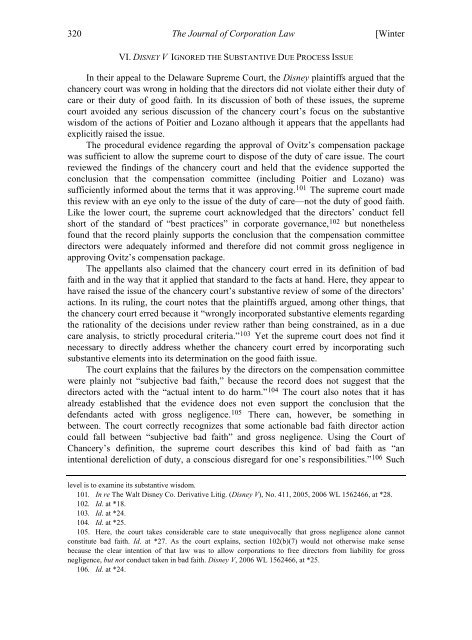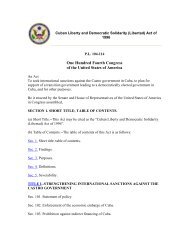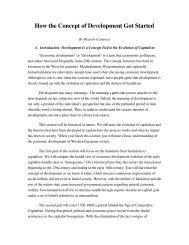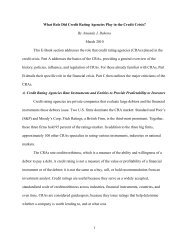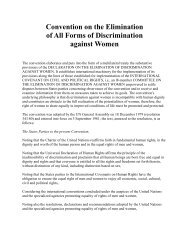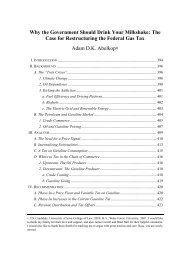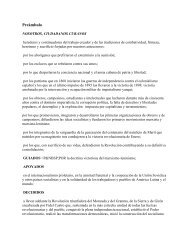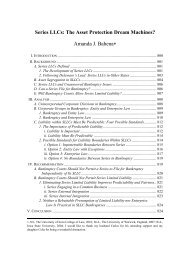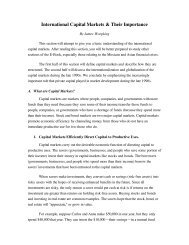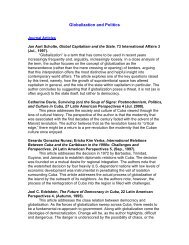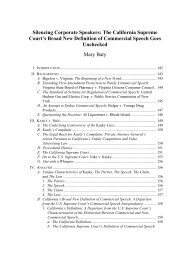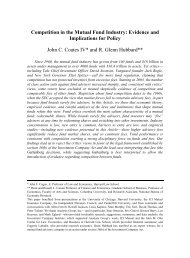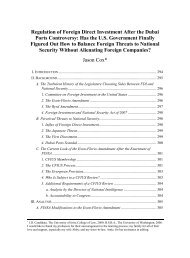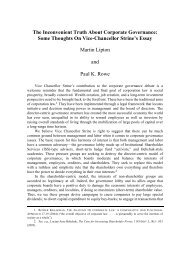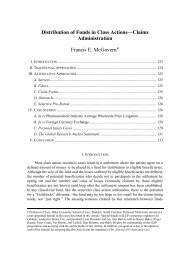Galactic Stupidity and the Business Judgment Rule - College of Law
Galactic Stupidity and the Business Judgment Rule - College of Law
Galactic Stupidity and the Business Judgment Rule - College of Law
Create successful ePaper yourself
Turn your PDF publications into a flip-book with our unique Google optimized e-Paper software.
320 The Journal <strong>of</strong> Corporation <strong>Law</strong> [Winter<br />
VI. DISNEY V IGNORED THE SUBSTANTIVE DUE PROCESS ISSUE<br />
In <strong>the</strong>ir appeal to <strong>the</strong> Delaware Supreme Court, <strong>the</strong> Disney plaintiffs argued that <strong>the</strong><br />
chancery court was wrong in holding that <strong>the</strong> directors did not violate ei<strong>the</strong>r <strong>the</strong>ir duty <strong>of</strong><br />
care or <strong>the</strong>ir duty <strong>of</strong> good faith. In its discussion <strong>of</strong> both <strong>of</strong> <strong>the</strong>se issues, <strong>the</strong> supreme<br />
court avoided any serious discussion <strong>of</strong> <strong>the</strong> chancery court’s focus on <strong>the</strong> substantive<br />
wisdom <strong>of</strong> <strong>the</strong> actions <strong>of</strong> Poitier <strong>and</strong> Lozano although it appears that <strong>the</strong> appellants had<br />
explicitly raised <strong>the</strong> issue.<br />
The procedural evidence regarding <strong>the</strong> approval <strong>of</strong> Ovitz’s compensation package<br />
was sufficient to allow <strong>the</strong> supreme court to dispose <strong>of</strong> <strong>the</strong> duty <strong>of</strong> care issue. The court<br />
reviewed <strong>the</strong> findings <strong>of</strong> <strong>the</strong> chancery court <strong>and</strong> held that <strong>the</strong> evidence supported <strong>the</strong><br />
conclusion that <strong>the</strong> compensation committee (including Poitier <strong>and</strong> Lozano) was<br />
sufficiently informed about <strong>the</strong> terms that it was approving. 101 The supreme court made<br />
this review with an eye only to <strong>the</strong> issue <strong>of</strong> <strong>the</strong> duty <strong>of</strong> care—not <strong>the</strong> duty <strong>of</strong> good faith.<br />
Like <strong>the</strong> lower court, <strong>the</strong> supreme court acknowledged that <strong>the</strong> directors’ conduct fell<br />
short <strong>of</strong> <strong>the</strong> st<strong>and</strong>ard <strong>of</strong> “best practices” in corporate governance, 102 but none<strong>the</strong>less<br />
found that <strong>the</strong> record plainly supports <strong>the</strong> conclusion that <strong>the</strong> compensation committee<br />
directors were adequately informed <strong>and</strong> <strong>the</strong>refore did not commit gross negligence in<br />
approving Ovitz’s compensation package.<br />
The appellants also claimed that <strong>the</strong> chancery court erred in its definition <strong>of</strong> bad<br />
faith <strong>and</strong> in <strong>the</strong> way that it applied that st<strong>and</strong>ard to <strong>the</strong> facts at h<strong>and</strong>. Here, <strong>the</strong>y appear to<br />
have raised <strong>the</strong> issue <strong>of</strong> <strong>the</strong> chancery court’s substantive review <strong>of</strong> some <strong>of</strong> <strong>the</strong> directors’<br />
actions. In its ruling, <strong>the</strong> court notes that <strong>the</strong> plaintiffs argued, among o<strong>the</strong>r things, that<br />
<strong>the</strong> chancery court erred because it “wrongly incorporated substantive elements regarding<br />
<strong>the</strong> rationality <strong>of</strong> <strong>the</strong> decisions under review ra<strong>the</strong>r than being constrained, as in a due<br />
care analysis, to strictly procedural criteria.” 103 Yet <strong>the</strong> supreme court does not find it<br />
necessary to directly address whe<strong>the</strong>r <strong>the</strong> chancery court erred by incorporating such<br />
substantive elements into its determination on <strong>the</strong> good faith issue.<br />
The court explains that <strong>the</strong> failures by <strong>the</strong> directors on <strong>the</strong> compensation committee<br />
were plainly not “subjective bad faith,” because <strong>the</strong> record does not suggest that <strong>the</strong><br />
directors acted with <strong>the</strong> “actual intent to do harm.” 104 The court also notes that it has<br />
already established that <strong>the</strong> evidence does not even support <strong>the</strong> conclusion that <strong>the</strong><br />
defendants acted with gross negligence. 105 There can, however, be something in<br />
between. The court correctly recognizes that some actionable bad faith director action<br />
could fall between “subjective bad faith” <strong>and</strong> gross negligence. Using <strong>the</strong> Court <strong>of</strong><br />
Chancery’s definition, <strong>the</strong> supreme court describes this kind <strong>of</strong> bad faith as “an<br />
intentional dereliction <strong>of</strong> duty, a conscious disregard for one’s responsibilities.” 106 Such<br />
level is to examine its substantive wisdom.<br />
101. In re The Walt Disney Co. Derivative Litig. (Disney V), No. 411, 2005, 2006 WL 1562466, at *28.<br />
102. Id. at *18.<br />
103. Id. at *24.<br />
104. Id. at *25.<br />
105. Here, <strong>the</strong> court takes considerable care to state unequivocally that gross negligence alone cannot<br />
constitute bad faith. Id. at *27. As <strong>the</strong> court explains, section 102(b)(7) would not o<strong>the</strong>rwise make sense<br />
because <strong>the</strong> clear intention <strong>of</strong> that law was to allow corporations to free directors from liability for gross<br />
negligence, but not conduct taken in bad faith. Disney V, 2006 WL 1562466, at *25.<br />
106. Id. at *24.


